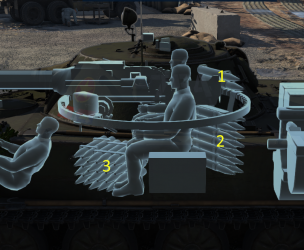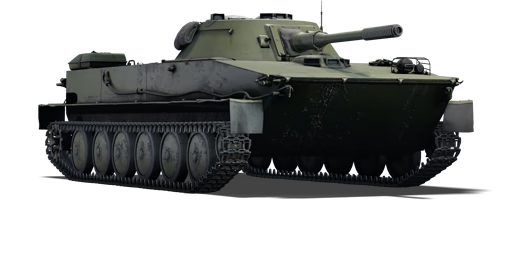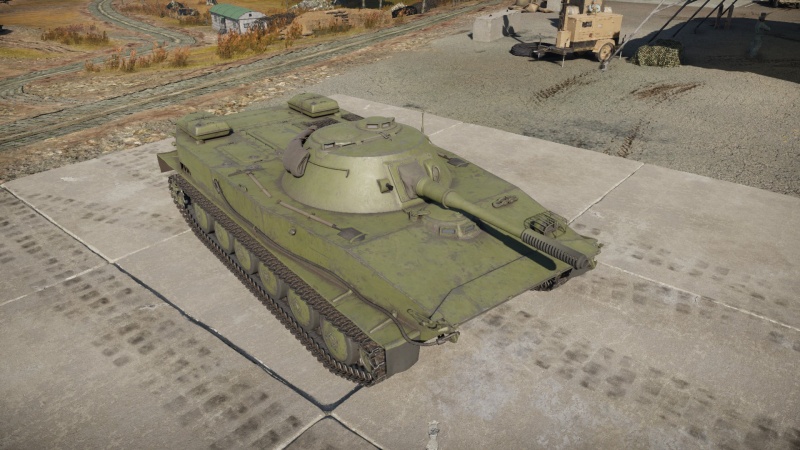Difference between revisions of "PT-76 (China)"
(→Ammunition: Updated) |
Indo_Pilot (talk | contribs) (→Machine guns: Updated) |
||
| (10 intermediate revisions by 7 users not shown) | |||
| Line 11: | Line 11: | ||
== Description == | == Description == | ||
<!-- ''In the description, the first part should be about the history of the creation and combat usage of the vehicle, as well as its key features. In the second part, tell the reader about the ground vehicle in the game. Insert a screenshot of the vehicle, so that if the novice player does not remember the vehicle by name, he will immediately understand what kind of vehicle the article is talking about.'' --> | <!-- ''In the description, the first part should be about the history of the creation and combat usage of the vehicle, as well as its key features. In the second part, tell the reader about the ground vehicle in the game. Insert a screenshot of the vehicle, so that if the novice player does not remember the vehicle by name, he will immediately understand what kind of vehicle the article is talking about.'' --> | ||
| − | The ''' | + | The '''PT-76 (плавающий танк, plavayushchiy tank, or ПТ-76)''' is a Soviet amphibious light tank that went into service in the early 1950s and quickly became the standard reconnaissance tank of the Soviet Army and other Warsaw Pact armed forces. It was widely exported to other allies all over the world. As China's southeast coastal area was unrestful in late 1957, and the terrain was harsh with massive water networks and rivers, China was committed to developing an indigenous amphibious tank that would be deployed along the southeast coastal area in the event of future conflict. The development code "Project 211 ([[Object 211]])" was assigned in July 1958, and China purchased the Soviet Union's PT-76 amphibious light tank to acquire the technology. The project underwent numerous revisions before entering production as the [[Type 63-I|Type 63 amphibious light tank]]. Since an early variant of the PT-76 was imported to China, it lacks the two-plane stabilizer that subsequent variants feature. |
| − | + | Introduced in [[Update 1.91 "Night Vision"]], the PT-76, as one of the first tanks to be armed with HEAT-FS, has little issue dealing with heavily armoured adversaries at any range. However, due to the restrictions of the main gun's calibre, post-penetration damage can be insufficient, necessitating additional shots. Nonetheless, it is a great asset to the Chinese Army's ground forces, which contributed to the development of the Type 63 amphibious light tank. | |
| + | |||
| + | In [[Update "La Royale"]], the tank was hidden from the Chinese ground vehicles tree and is no longer available for research, though it will remain available for players who have researched and purchased the unit. Its place in the vehicle tree was replaced by the [[Object 211]]. | ||
== General info == | == General info == | ||
| Line 79: | Line 81: | ||
==== Ammunition ==== | ==== Ammunition ==== | ||
| − | { | + | {{:D-56T (76 mm)/Ammunition|BR-354N, 53-BR-354, BK-354M, OF-350M}} |
| − | |||
| − | |||
| − | |||
| − | |||
| − | |||
| − | |||
| − | |||
| − | |||
| − | |||
| − | |||
| − | |||
| − | |||
| − | |||
| − | |||
| − | |||
| − | |||
| − | |||
| − | |||
| − | |||
| − | |||
| − | |||
| − | |||
| − | |||
| − | |||
| − | |||
| − | |||
| − | |||
| − | |||
| − | |||
| − | |||
| − | |||
| − | | BR-354N | ||
| − | |||
| − | |||
| − | |||
| − | |||
| − | |||
| − | |||
| − | |||
| − | |||
==== [[Ammo racks]] ==== | ==== [[Ammo racks]] ==== | ||
| Line 139: | Line 101: | ||
{{Specs-Tank-Weapon|2}} | {{Specs-Tank-Weapon|2}} | ||
<!-- ''Offensive and anti-aircraft machine guns not only allow you to fight some aircraft but also are effective against lightly armoured vehicles. Evaluate machine guns and give recommendations on its use.'' --> | <!-- ''Offensive and anti-aircraft machine guns not only allow you to fight some aircraft but also are effective against lightly armoured vehicles. Evaluate machine guns and give recommendations on its use.'' --> | ||
| − | {{main| | + | {{main|Type 59 (7.62 mm)}} |
{| class="wikitable" style="text-align:center" width="50%" | {| class="wikitable" style="text-align:center" width="50%" | ||
|- | |- | ||
| − | ! colspan="5" | [[ | + | ! colspan="5" | [[Type 59 (7.62 mm)|7.62 mm Type 59]] |
|- | |- | ||
! Mount !! Capacity (Belt) !! Fire rate !! Vertical !! Horizontal | ! Mount !! Capacity (Belt) !! Fire rate !! Vertical !! Horizontal | ||
Latest revision as of 01:11, 18 December 2023
| This page is about the light tank PT-76 (China). For other versions, see PT-76 (Family). |
Contents
Description
The PT-76 (плавающий танк, plavayushchiy tank, or ПТ-76) is a Soviet amphibious light tank that went into service in the early 1950s and quickly became the standard reconnaissance tank of the Soviet Army and other Warsaw Pact armed forces. It was widely exported to other allies all over the world. As China's southeast coastal area was unrestful in late 1957, and the terrain was harsh with massive water networks and rivers, China was committed to developing an indigenous amphibious tank that would be deployed along the southeast coastal area in the event of future conflict. The development code "Project 211 (Object 211)" was assigned in July 1958, and China purchased the Soviet Union's PT-76 amphibious light tank to acquire the technology. The project underwent numerous revisions before entering production as the Type 63 amphibious light tank. Since an early variant of the PT-76 was imported to China, it lacks the two-plane stabilizer that subsequent variants feature.
Introduced in Update 1.91 "Night Vision", the PT-76, as one of the first tanks to be armed with HEAT-FS, has little issue dealing with heavily armoured adversaries at any range. However, due to the restrictions of the main gun's calibre, post-penetration damage can be insufficient, necessitating additional shots. Nonetheless, it is a great asset to the Chinese Army's ground forces, which contributed to the development of the Type 63 amphibious light tank.
In Update "La Royale", the tank was hidden from the Chinese ground vehicles tree and is no longer available for research, though it will remain available for players who have researched and purchased the unit. Its place in the vehicle tree was replaced by the Object 211.
General info
Survivability and armour
Armour type:
- Rolled homogeneous armour
- Cast homogeneous armour (Gun mantlet)
| Armour | Front | Sides | Rear | Roof |
|---|---|---|---|---|
| Hull | 10 mm (80°) Top 13 mm (44°) Bottom |
13 mm Top 10 mm Bottom |
6 mm (1°) Top 6 mm (46°) Bottom |
6 mm |
| Turret | 15 mm (32-35°) Turret front 15 mm (19-32°) Gun mantlet |
15 mm (35°) | 15 mm (35°) | 6 mm |
| Cupola | 10 mm | 10 mm | 10 mm | 6 mm |
Notes:
- Suspension wheels are 10 mm thick.
- Tracks are 15 mm thick.
Almost every tank in the game will be able to destroy the PT-76 with relative ease due to its ultra-thin armour. Avoid tanks with access to heavy machine guns on their turrets such as most American tanks, the IS-2 (1944), etc. This vehicle has next to no armour due to its amphibious abilities and can be easily destroyed even by machine guns.
Also, keep well clear of enemy SPAA. 12.7 mm guns and above will absolutely wreck this tank. In particular, the Wirbelwind is a significant threat. It has good penetration at range and will literally saturate the vehicle with autocannon shells. Just a short burst from the quad 20 mm guns will finish the PT-76 off.
Mobility
| Game Mode | Max Speed (km/h) | Weight (tons) | Engine power (horsepower) | Power-to-weight ratio (hp/ton) | |||
|---|---|---|---|---|---|---|---|
| Forward | Reverse | Stock | Upgraded | Stock | Upgraded | ||
| Arcade | 49 | 8 | 14 | 372 | 458 | 26.57 | 32.71 |
| Realistic | 44 | 7 | 212 | 240 | 15.14 | 17.14 | |
Modifications and economy
Go for parts and FPE (safety first) and then go for the AP and HEATFS shells so penetrating enemies won't be such a problem anymore. Then go for mobility modifications and then the ESS.
Armaments
Main armament
| 76 mm D-56T | Turret rotation speed (°/s) | Reloading rate (seconds) | |||||||||||
|---|---|---|---|---|---|---|---|---|---|---|---|---|---|
| Mode | Capacity | Vertical | Horizontal | Stabilizer | Stock | Upgraded | Full | Expert | Aced | Stock | Full | Expert | Aced |
| Arcade | 40 | -4°/+31° | ±180° | N/A | 16.2 | 22.4 | 27.2 | 30.1 | 32.0 | 6.50 | 5.75 | 5.30 | 5.00 |
| Realistic | 10.1 | 11.9 | 14.5 | 16.0 | 17.0 | ||||||||
Ammunition
| Penetration statistics | |||||||
|---|---|---|---|---|---|---|---|
| Ammunition | Type of warhead |
Penetration @ 0° Angle of Attack (mm) | |||||
| 10 m | 100 m | 500 m | 1,000 m | 1,500 m | 2,000 m | ||
| BR-354N | APCR | 152 | 148 | 129 | 109 | 92 | 78 |
| BR-354 | APHE | 99 | 97 | 89 | 80 | 72 | 65 |
| BK-354M | HEATFS | 200 | 200 | 200 | 200 | 200 | 200 |
| OF-350M | HE | 10 | 10 | 10 | 10 | 10 | 10 |
| Shell details | ||||||||||||
|---|---|---|---|---|---|---|---|---|---|---|---|---|
| Ammunition | Type of warhead |
Velocity (m/s) |
Projectile mass (kg) |
Fuse delay (m) |
Fuse sensitivity (mm) |
Explosive mass (TNT equivalent) (g) |
Ricochet | |||||
| 0% | 50% | 100% | ||||||||||
| BR-354N | APCR | 950 | 3.3 | - | - | - | 66° | 70° | 72° | |||
| BR-354 | APHE | 655 | 6.5 | 1.2 | 14 | 49.28 | 47° | 60° | 65° | |||
| BK-354M | HEATFS | 700 | 7 | 0.05 | 0.1 | 550 | 65° | 72° | 77° | |||
| OF-350M | HE | 680 | 6.2 | 0.05 | 0.1 | 621 | 79° | 80° | 81° | |||
Ammo racks

| Full ammo |
1st rack empty |
2nd rack empty |
3rd rack empty |
Visual discrepancy |
|---|---|---|---|---|
| 40 | 39 (+1) | 25 (+15) | 1 (+39) | No |
Machine guns
| 7.62 mm Type 59 | ||||
|---|---|---|---|---|
| Mount | Capacity (Belt) | Fire rate | Vertical | Horizontal |
| Coaxial | 1,000 (250) | 600 | N/A | N/A |
Usage in battles
Since the PT-76 doesn't have much armour, avoid directly confronting enemy tanks. In order to defeat heavy/medium tanks, watch them and fire when they are not aiming or focusing on you. Use the light tank's manoeuvrability and fire rate to deliver pin-point hits onto the enemy's flanks, then retreat back in to cover before they can get a fix on the firing location. The PT-76 is also helpful in scouting enemy positions for its allies so they can bring in more firepower. As previously mentioned, this tank does not have the armour nor the crew to take on enemies head-on, so try to remain stealthy. It functions great as a scout tank in Simulator Battles.
While the PT-76 has amphibious capabilities, it is not necessary to use them all the time. Keep in mind that the PT-76 can only go about 10 km/h in the water, so utilize the ability to travel on land as well. Instead, use the water to make an escape or take a shortcut. As an example, drive into the water if an enemy has spotted you, and take cover behind an off-shore rock. Driving through a river to flank the enemy is also possible if a bridge is not nearby. Take caution that reversing in the water is slow, if not nonexistent, which may get the PT-76 stuck if driven into an obstacle. Also make sure to check the map, as some maps like Eastern Europe have rivers with no way to get back onto land, or at least not many.
Otherwise, avoid directly confronting an enemy. Instead, take cover and scout. Another good tactic to use is watching the enemy - find a spot where they can't engage you and watch them. Wait for the right moment; when the enemy is reloading, aiming somewhere else, not noticing the PT-76, is attacking an ally, etc, quickly check to make sure no other enemy can target you and send a shell towards your enemy! Try to snipe at the enemy, but make sure to avoid all enemy fire, as all tanks can penetrate the PT-76's armour (even the GAZ-AAA (4M) technically has enough penetration to get through the tank's rear armour!).
The amphibious capabilities are a huge helper to the vehicle, allowing it to reach unusual sniper areas that vehicles without said capabilities could not reach (e.g. hiding behind the rocks near the jetty on Normandy). Make sure to relocate after knocking out enemies or being spotted, however, as they will know the PT-76's location and likely broadcast it to other players, most often resulting in the PT-76 being destroyed.
The HEAT-FS shell is powerful in terms of penetration, but the post-penetration damage is lacking compared to other Soviet shells. Not to say that the BK-350M is weak (it's actually quite amazing for a HEAT shell), but oftentimes, 2 or more shots will be needed to destroy an enemy, particularly the more spacey vehicles like the Tiger 1 and Panther. It would be wise, therefore, to look up crew and module locations on enemy vehicles in order to make your shots as lethal as possible.
Pros and cons
Pros:
- Good mobility, amphibious
- Powerful HEAT-FS round
- Has access to scouting
- Low profile
- Much better gun elevation/depression speed than the Soviet PT-76B
Cons:
- Lacks the two-plane stabilizer of the Soviet PT-76B, hard to fire on the move or in water
- Very poor armour, vulnerable to heavy machine gunfire
- Stock APCR round has disappointing angled performance and post-penetration damage
- Easy target for aircraft
- Susceptible to overpressure damage
- Looks very similar to the Soviet PT-76B (gun barrel is slightly different), can be confused for it in Simulator Battles
History
The People's Republic of China (PRC) received a number of PT-76 amphibious light tanks from the Soviet Union in the 1950s.
In 1958, the PLA decided to design an amphibious light tank of their own based off the PT-76. The first prototype, known as the WZ-221 or Type 60, was tested in 1959 and the final design was approved in December 1963. The final design had the factory designation WZ-211 and entered production as the Type 63. Upgraded variants of the Type 63 are still in service with the PLA as of 2021.
Media
- Skins
- Videos
See also
- Other vehicles of similar configuration and role
External links
| China light tanks | |
|---|---|
| Type 63 | Object 211 · Type 63 · ZTS63 |
| Type 62 | Type 62 |
| WZ551 | ZSL92 · PTL02 · WMA301 |
| ZBL08 | ZLT11 |
| Type 86 | ZBD86 |
| WZ502 | ZBD04A |
| ROC | M41D · M64 |
| Type 59 | QN506 |
| USA | ␗M8 LAC · ␗M3A3 Stuart · ␗M3A3 (1st PTG) · ␗M5A1 · ␗M24 · ␗M18 GMC · ␗M41A3 |
| USSR | ␗T-26 · T-26 No.531 · ␗PT-76 |





